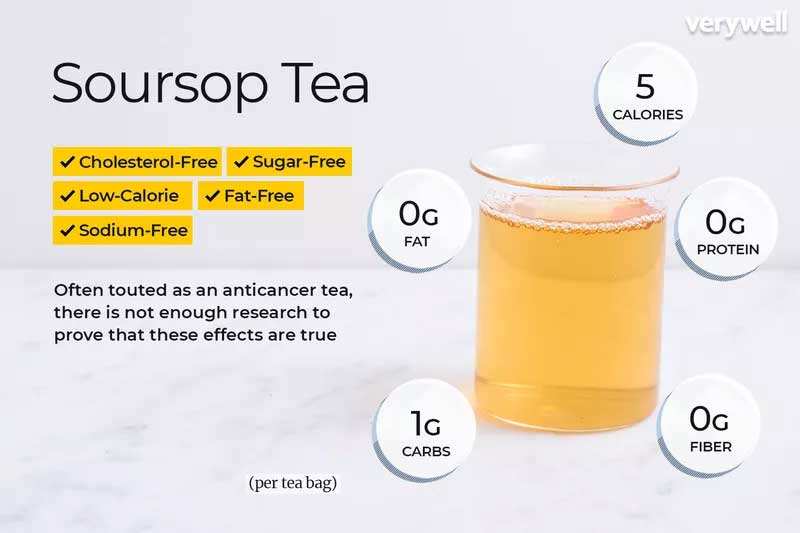
Soursop tea is an herbal tea that is made from the leaves of the soursop fruit tree. Soursop tea is also called graviola tea and is rumored to have significant powers to prevent or treat cancer. Unfortunately, however, researchers have not been able to prove this benefit when they study soursop leaves in clinical studies.1 In addition, consuming soursop (especially long-term) may cause harm.
What Is Soursop Tea?
Soursop trees are native to tropical areas in North and South American. The soursop fruit is a large green oval or heart-shaped fruit with thorny skin.2 Some sources describe the fruit as having a musky taste, while others compare the taste to that of a banana or a papaya. People use the fruit to make juice, smoothies, ice cream, and other sweet treats.3
Many people also use the leaves of the soursop fruit tree to make soursop tea. Soursop is also called graviola, so the drink may also be referred to as graviola tea. Other names for soursop include guanabana, custard apple, and Brazilian paw paw.2
Some people also combine soursop tea with other ingredients including soursop fruit, matcha, or other herbal blends to tailor the taste or boost the health benefits.
Does Soursop Tea Contain Caffeine?
Soursop tea is not a “tea” in the traditional sense and is not made from the leaves of the Camellia sinensis plant, like black tea or green tea. It is brewed using just parts of the soursop plant,4 which does not contain any caffeine. Therefore soursop tea is completely caffeine-free.
Soursop Tea Health Benefits
The most significant soursop tea health benefit that you’ll see advertised online or in stores is cancer treatment. Graviola tea or the tea made from soursop leaves is believed by many to treat, prevent, and even cure cancer. However, right now there is no overwhelming evidence to support those claims.
Preliminary studies suggest that soursop has both chemopreventative and therapeutic potential,5 but there are no conclusive results and further research is warranted.
Well-respected cancer organizations still advise caution:
- Memorial Sloan Kettering Cancer Center acknowledges that graviola has shown anticancer properties in lab studies, but human data are lacking.
- Cancer Research UK (a non-profit cancer organization based in England) states that there is no evidence to show that graviola works as a cure for cancer.6
- The Cancer Treatment Centers of America advise, “Experts warn against using the fruit to treat cancer. While research suggests soursop can fight cancer, it has not been studied in humans. As a result, there is no evidence of its safety or efficacy.”7
In addition to its anticancer properties, some people use soursop to treat infections, coughs, weight loss, herpes, inflammation of the nose and throat, and parasitic infections such as lice. Others may use graviola tea or soursop fruit to induce vomiting or to increase relaxation.
Soursop Tea Risks and Side Effects
Memorial Sloan Kettering Cancer Center advises that you don’t consume soursop or soursop leaves if you:
- Are taking blood pressure medication2
- Are taking diabetes medication
- If you are having any nuclear imaging studies performed2
The organization also adds that repeated use may cause liver and kidney toxicity and that side effects of soursop may include movement disorders and myeloneuropathy (a condition with symptoms similar to Parkinson’s disease).2
A Word From Verywell
If you or a loved one has cancer, it can be tempting to try an alternative treatment that promises hope. There are some holistic treatments that may provide relief from certain cancer symptoms. However, some anticancer treatments may do more harm than good.
Before considering soursop, soursop leaves or any herbal treatment, speak with your healthcare provider to make sure that the treatment you use to get well doesn’t cause harm.
Sources:
- Qazi AK, Siddiqui JA, Jahan R, et al. Emerging therapeutic potential of graviola and its constituents in cancers. 2018;39(4):522-533. doi:10.1093/carcin/bgy024
- Memorial Sloan Kettering Cancer Center. 2019.
- Gajalakshmi S, Vijayalakshmi S, Devi Rajeswari V. Phytochemical and pharmacological properties of Annona Muricata: a review.International Journal of Pharmacy and Pharmaceutical Sciences. 2012;4(2).
- Mochado de Moraes I, Ribeiro P, et al. UPLC–QTOF–MS and NMR analyses of graviola (Annona muricata) leaves.Revista Brasileira de Farmacognosia. 2016;26(2):174-179. doi:10.1016/j.bjp.2015.12.001
- Qazi AK, Siddiqui JA, Jahan R, et al. Emerging therapeutic potential of graviola and its constituents in cancers. Carcinogenesis. 2018;39(4):522-533. doi:10.1093/carcin/bgy024
- Cancer Research UK. Graviola (soursop). Updated October 22, 2018.
- Cancer Treatment Centers of America. Experts warn against using soursop to fight cancer. 2017.
Important Notice: This article was originally published at www.verywellfit.com by Malia Frey where all credits are due. Medically reviewed by Jonathan Valdez, RDN, CDE, CPT
Disclaimer
The watching, interacting, and participation of any kind with anything on this page does not constitute or initiate a doctor-patient relationship with Dr. Farrah™. None of the statements here have been evaluated by the Food and Drug Administration (FDA). The products of Dr. Farrah™ are not intended to diagnose, treat, cure, or prevent any disease. The information being provided should only be considered for education and entertainment purposes only. If you feel that anything you see or hear may be of value to you on this page or on any other medium of any kind associated with, showing, or quoting anything relating to Dr. Farrah™ in any way at any time, you are encouraged to and agree to consult with a licensed healthcare professional in your area to discuss it. If you feel that you’re having a healthcare emergency, seek medical attention immediately. The views expressed here are simply either the views and opinions of Dr. Farrah™ or others appearing and are protected under the first amendment.
Dr. Farrah™ is a highly experienced Licensed Medical Doctor certified in evidence-based clinical nutrition, not some enthusiast, formulator, or medium promoting the wild and unrestrained use of nutrition products for health issues without clinical experience and scientific evidence of therapeutic benefit. Dr. Farrah™ has personally and keenly studied everything she recommends, and more importantly, she’s closely observed the reactions and results in a clinical setting countless times over the course of her career involving the treatment of over 150,000 patients.
Dr. Farrah™ promotes evidence-based natural approaches to health, which means integrating her individual scientific and clinical expertise with the best available external clinical evidence from systematic research. By individual clinical expertise, I refer to the proficiency and judgment that individual clinicians acquire through clinical experience and clinical practice.
Dr. Farrah™ does not make any representation or warranties with respect to the accuracy, applicability, fitness, or completeness of any multimedia content provided. Dr. Farrah™ does not warrant the performance, effectiveness, or applicability of any sites listed, linked, or referenced to, in, or by any multimedia content.
To be clear, the multimedia content is not intended to be a substitute for professional medical advice, diagnosis, or treatment. Always seek the advice of your physician or other qualified health providers with any questions you may have regarding a medical condition. Never disregard professional medical advice or delay in seeking it because of something you have read or seen in any website, video, image, or media of any kind. Dr. Farrah™ hereby disclaims any and all liability to any party for any direct, indirect, implied, punitive, special, incidental, or other consequential damages arising directly or indirectly from any use of the content, which is provided as is, and without warranties.








